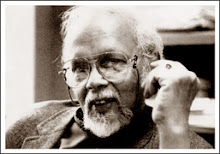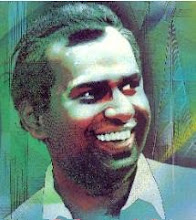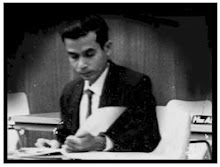| Gamini Haththotuwegama is no more. The man, known to some as GK, to others as ‘Gamini’, ‘Hatha’, ‘Haththa’ or simply as ‘Sir’, hailed as the Father of Street Theatre in Sri Lanka, will take his final curtain call this evening. As befitting such a colossus, the Ministry of Cultural Affairs has come forward to give him such honour as is his due, with deference of course to the wishes of the family. In a meeting to discuss funeral arrangements, a Ministry official said that the route that the funeral procession will take from the ‘Kala Bhavana’ to the ‘Kanatte’ will be lined with white flags. Rajith, the son, remarked with the wit, smile and acute consciousness of things human so reminiscent of his father, ‘eya aasa rathu paatata (he preferred red)!’ Like the father, again, Rajith and his sister Chamindu displayed a healthy disregard for ceremony and like their father once again showed a deference to the will of an innocent public want (in this instance the need to demonstrate grief). They did not protest.
Red. Yes, that was his colour and ‘redness’ was the theme song that meandered as an unmistakable thread tying together all the things this remarkable man took on. He is called the Father of Street Theatre and rightfully too, but theatre was but one of the many mediums he used to articulate his insightful reading of the social, political and cultural. He was dramatist, actor, critic and human being. And he was a teacher through and through.
He will be remembered fondly. Remembrance and grief are largely personal things and one should leave it to the individuals whose lives were touched by the man to remember and lament as per their personal preference. He was a deeply sensitive man but not one given to tearing in public except on extremely rare occasions. That’s a cue I suppose for all of us.
Who was Gamini Haththotuwegama though? What was the ‘red’ in his life and work? As I browsed the web for a picture of the man, I came across a lengthy comment by Ajith Samaranayake, perhaps the only other person who was as articulate as Haththa (that’s how my contemporaries at Peradeniya referred to him) in both English and Sinhala on the vast range of subjects that come under ‘literature and arts’. Ajith, alas, predeceased Haththa by a few years (and what a loss!).
Ajith was referring to a lecture delivered by Haththa titled ‘Unreasonable postulates and treasonable practices correlative to English’. It was, as Ajith points out, a rather portentous title and come to think of it, quite un-Haththa like. What caught my eyes was a quote. Haththa had approvingly read out something that Ernest Macintyre had written:
"…when one grows into another culture through the intensive root-cutting education in English, the creative urge to truthfully turn it back on the soil you were pulled away from, the sentient world of the indigenous culture, is a magnificent compensation, the quality of which is not sometimes available even to those with unmoved roots, in a world of much movement."
It was natural that Haththa saluted this observation because Macintyre could very well have been talking about him for he, more than anyone else, embodied the creature described; he cut back through the layers of mis-education, sought his native soil and danced on it with all the grace and confidence that the process ingrained in him, in terms of ideological prerogative, nuance to cultural difference and the ability to pick and choose his waters from the many wells he had encountered and make thereafter a heady cocktail that could jolt his audience with audacity, tasteful humour and creative genius.
Haththa knew his English. He was acutely aware of its power, its coercive and violent potential and its other ‘kaduwa’ quality of marking distinction, leaving out and cultural political manipulation. He used it against itself, so to speak, disrupting thereby the entire hegemonic discourse. I remember him telling me in the terrible days following the UNP-JVP bheeshanaya that the JVP could have told the people that English is a necessary part of the revolution. His point was that English, one of the many weapons at the disposal of the enemy, should be picked up and turned against the oppressor. The beauty of his disposition was that when he used the kaduwa he dealt with ‘kaduwaness’ with both unforgiving and subtle strokes, equally effective as per occasion.
He was respected, yes; tolerated even, but Gamini Haththotuwegama was never embraced by English Departments in our universities. Why not? The answer can be obtained in the following observation: "What’s the point of giving English at university levels, feeding the students with the highest academic equipment available - the most radical, nay revolutionary cultural theory, by presumably some of the best literary-linguistic brains in the business, yes feeding students whose acquaintance with our culture begins and ends presumably with ‘Thannane naa - thana-naa’ sung by Ba and Sa (and a herd of tune-repeating umbaas) who have been successful as no others have in setting a price to our folk rhythms, as a street drama actor put it so succinctly?"
There is then a marked distaste for doing ‘The Macintyre Number’ among those who study, teach, write, do business, brag and in other ways and for a variety of reasons think that their ‘fluency’ in the language gives them automatic membership in that dubious club called ‘The Elite’. As such these creatures are clearly part of the problem and are sadly compromised in the neo-colonialist project even as they speak on behalf of and champion the subaltern (how presumptuous!) and rile against hegemonic discourse.
The fact of the matter is that Haththa, even as he called them out for intellectual sloth and ideological confusion was far better at what they believed they were good at: teaching and writing. A few weeks ago someone told me that no one at Peradeniya writes as well as Gamini Haththotuwegama. I don’t know because not many at Peradeniya actually write, but it would be hard to find someone of whose writing it could be said ‘Streets ahead of GK’.
This is true not only of academic writing and also creative work. Haththa was not given to spending too much time on producing academic treatise, but when he did, it was always cogent, illuminating and wonderful to read. His essay on Lakdasa Wikkramasinha is a case in point. And outside the lecture theatre, as a creative artist, he was peerless. No one at Peradeniya can claim to have done as much to the development and understanding of theatre, except perhaps Ashley Halpe, probably the only person in that Department who respected and admired Haththa and moreover was able to have a mutually beneficial conversation on a wide range of topic related to literature and arts.
Ajith puts it best when he remarks on that lecture thus: It is also a lecture which only GK could have delivered because if there has ever been a teacher of English who has effortlessly related himself to the wider Sinhala socio-cultural milieu without pandering to populist whims or compromising his intellectual integrity it has been Gamini K. Haththotuwegama.
His ‘redness’ was of course not limited to a battle with ‘kaduwaness’, he touched all aspects of social injustice in his work, stood with and for the oppressed, and taught them not to hate but to effectively challenge the structures that kept them down. He gave us all a sense of dignity and thereby empowered us in the most important element in that oft-caricatured thing called ‘agitation’.
Every man’s life is an epic. Haththa will be remembered for that endearing line that has become a veritable tag-line to the street theatre scene in the country: yadam bindala gejji maala thanaganin (break your chains and make anklets and necklaces out of them). It is imperative that his students (and their numbers are legion) understand that the chains referred to are multifaceted and not limited to class-related politics (as per the quote in the Communist Manifesto, ‘the proletarians have nothing to lose but their chains; they have a world to win’). He was larger than that. And this is why Gamini Haththotuwegama will live long and we will hear and be empowered by the drama that was his life long after his ashes go cold. Some curtains refuse to fall, or do so slowly and only after the drama is really, really, done. It is not yet. Gamini Haththotuwegama plays on and we hear his voice; and his words reverberate with wit, insight and a rare kind of love. by. Malinda Seneviratne |




































No comments:
Post a Comment